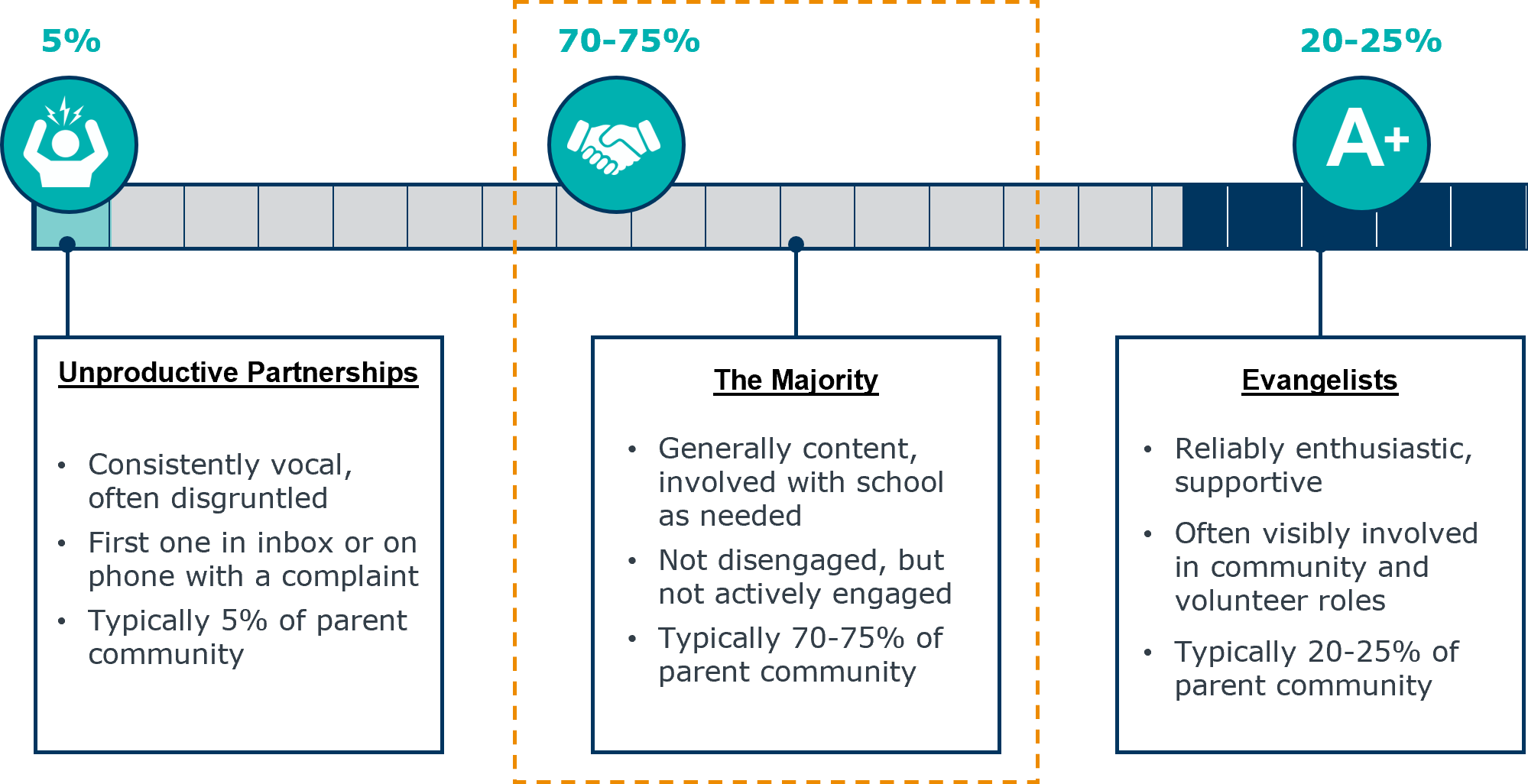Changing parents means new expectations for independent schools
Over the past year, EAB’s Independent School Executive Forum conducted research on the beliefs, values, and expectations of today’s independent school parents. What we found is that these parents—dominated by Gen Xers and millennials—are much more transactional, anxious, and less trusting than the baby boomers who preceded them. Overwhelmingly, heads of school agree, citing anecdotes from experiences with parents at their own institutions.
Unfortunately, these changes have led to misalignments between what today’s parents expect and what independent schools offer, and there are major costs to these misalignments. They include schools having to spend more time and energy contending with parent concerns; greater risk to school reputation as disgruntled parents leverage word of mouth, social media and the press to spread negative PR; and missing out on opportunities to uniquely fulfill parents’ new desires to forge lasting partnerships with their institutions.
To mitigate these consequences, independent schools must use EAB’s new approach, which involves rethinking which parents they invest the most time with and how they serve them. In doing so, schools can develop lasting partnerships with their parent communities that can yield dividends in their enrollment and advancement efforts.
What heads of school think about today's parents
81%
agree that transactional attitudes among parents have increased67%
agree that parent anxiety has increased74%
agree that there is a growing number of more vocal and/or time-consuming parentsTo explain these changes in parent characteristics, we detail the socio-economic factors that have contributed to these shifts over the past few decades.
Why are today’s parents more transactional?
- Independent school costs more. Between 2007 and 2017, independent school tuition increased over 57%, while median income in even the 95th percentile of households only increased about 29%.
- Gen Xers and millennials have lower incomes, less wealth, and more debt than their parents. 74% of Gen Xers have less wealth than their parents while carrying six times more debt; millennials have fared even worse, as they’ve experienced the slowest economic growth of any generation—being hit by the dot-com bubble bursting, the Great Recession, and the COVID recession, all just in the past 20 years since the oldest millennials joined the workforce.
Why are today’s parents more anxious?
- Parents worry more than ever about their children’s professional trajectories and future happiness. They wonder whether their children will be successful given the challenge of getting into a good college and determining what to study to secure a job in the future. They also worry about their children’s resilience in the face of intense stress and increasing mental health diagnoses.
- Parents are concerned about the state of the world. Between the current worldwide pandemic, the hundreds of mass shootings Americans have endured this century, the political polarization, and concerns about our changing climate, parents don’t know whether their children are building toward a secure future.
Why are today’s parents less trusting?
- Millennials are less trusting of institutions. According to a 2015 poll by Harvard University’s Institute of Politics, only 11% of millennials trust the media, 12% trust Wall Street, and 14% trust Congress to “do the right thing.”
- Nearly half of young people believe that people are “selfish, exploitative and untrustworthy,” according to Pew Research Center. In fact, 46% of young people (ages 18-29) identified as “low trusters” compared to only 19% of baby boomers.
These factors have combined to produce parents who are incredibly anxious about their children’s futures, which has culminated in a form of child rearing known as “intensive parenting,” an umbrella term for helicopter, snowplow, and drone parents, among others. This has significant implications for interactions between independent schools and parents, as today’s parents spend so much more time focused on what is happening at school.
Learn More About Intensive Parenting
Today’s parents’ expectations are misaligned with what schools have to offer
Unfortunately, these changes among today’s parents have led to two misalignments with independent schools:
- Misalignment #1: Independent schools typically focus on the larger school community, shared goals, and rich traditions; but today’s transactional parents focus more on their individual child, the fulfillment of unique student goals and experiences, and the delivery of specific outcomes.
- Misalignment #2: Independent schools have typically been trusted to manage children’s education and operated with parent involvement only as needed; but now there is an expectation among more anxious and less trusting parents that they will control more aspects of their children’s educational experiences.
Three major costs of school-parent misalignment
-
Consumes time and energy
Schools invest more time and energy to address vocal parents’ concerns
-
Risk to school reputation
Negative PR threatens schools’ reputations and brands as disgruntled parents leverage words of mouth, social media and the press
-
Lost opportunities
Schools miss the chance to uniquely fulfill the new desires of the majority of parents to forge lasting partnerships
A new approach to today’s parents
To mitigate these consequences, independent schools need a new approach, which includes rethinking which parents they invest the most time with and how they serve them.
First, rather than focusing on the 5% of parents who are disgruntled, vocal, and difficult to satisfy, schools must pivot to meeting the needs of the majority of parents, the 70–75% who are generally content, but not actively engaged with the school.

Second, schools need to move away from ad-hoc programming to an intentional approach to parent education that fulfills the new expectations and desires of today’s parents. This reduces the risk of parents becoming unproductive partners and can even grow the number of parent evangelists, those individuals who actively help progress institutional enrollment and advancement goals. Here we outline what this approach looks like.
Avoid the potential risk of unproductive partnerships
Use parent education to build trust
Today’s parents’ needs have evolved to expect their own educational programming from independent schools. Intensive parents are always seeking expertise when it comes to the development of their children to make sure they’re getting things “right.” They also seek a level of insight, access, and knowledge about the school’s approach to educating their children so that they can trust and feel secure in their commitment to your institution. As a result, schools need to utilize parent education to build trust within their parent communities.
Address parent concerns through surveying
Schools invest a great deal of time and effort to address the problems and concerns of vocal parents, while the majority is often too busy or not sufficiently engaged to alert the school to their issues, which are missed until they escalate. Rather than focusing primarily on the needs of the vocal parents who raise their hands, take the temperature of ALL parents to surface and address issues early. Using quick and easy online surveys provides a methodical way of gathering parent feedback and mitigating parent anxiety; it also serves to demonstrate your commitment to meeting the needs of your parents as valued partners within the school community.
Capitalize on the opportunity to build lasting parent partnerships
Fulfill intensive parents' desire for student perspective
We’ve identified an opportunity to meet a core desire among today’s parents: seeking insight into the student perspective. Intensive parents want their children’s individual needs and voices to be recognized; bringing the student perspective into parent programming is a huge opportunity for independent schools to show how in tune you are with their children, ensuring you are fulfilling this desire for today’s intensive parents.
Connect parents through dedicated communities
Though today’s parents are more “connected” than ever online, research shows they are increasingly isolated and seeking connection. These circumstances create a unique opportunity for independent schools to satisfy the unmet need for community and connection among today’s parents to leverage the benefits of brand evangelism, including increasing positive word of mouth, and bolstering support for ongoing advancement and enrollment efforts.
Work with EAB to create lasting parent partnerships
EAB has developed resources to help independent schools implement the strategies described above to build parent trust, mitigate their anxiety, fulfill their desires, and combat their transactional natures. Through a comprehensive process for setting and meeting goals to improve school-parent relations, EAB will support you every step of the way to ensure that you are making the most of your parent partnerships.
More Blogs

Building systems for principal success: 3 key lessons for district leadership

How education leaders can get good answers in the age of AI

The five topics independent school leaders were most curious about in the past year
Great to see you today! What can I do for you?